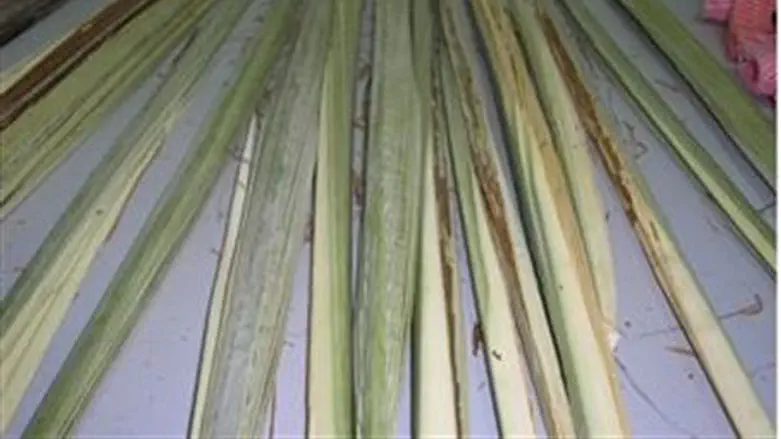
The growing tensions between Israel and Egypt may affect the Jewish holiday of Sukkot this year, but only pricewise.
According to a report on IDF Army Radio on Wednesday, Egypt has decided not to export lulavs (palm tree fronds) to Israel for the Sukkot holiday this year. The report said that the reason cited for the decision is the deterioration in ties between the two countries.
The lulav is one of the "Four Species" – along with the hadas (myrtle), the aravah (willow) and the etrog (citron) – that are mandated by the Torah to be used in special prayers that are part of the synagogue services on each of the seven days of the holiday of Sukkot, excepting the Sabbath.
The holiday begins in just four weeks, on the evening of Wednesday, October 12. Halakhah, Jewish law, specifies standards for lulavs that are considered "kosher" and many Jews spend hours choosing a lulav that they are sure meets the stringent specifications, often paying significant sums for the species and owning silver or other ornamental holders for them so as to perform the commandment in splendor.
Only decades ago, however, before the State of Israel's demand and the advent of modern transportation made the species accessible, most Jewish communities worldwide had only one or two exemplars of the Four Species, which were handed around the congregation during the prayers.
Egypt is the central exporter of lulavim to Israel, and provides about half a million palm fronds annually, the general demand being 600 to 700 thousand lulavim. IDF Radio said that export of lulavim to the Jewish communities in the United States and Europe has also stopped.
The report said that the Israeli Ministry of Agriculture has announced that Egypt’s decision is expected to result in an increase in the price of lulavim for Israelis this year. The Ministry reportedly said it tried to negotiate with the Egyptian authorities to get them to change their minds, but they stubbornly refused.
The Ministry will try to ensure that there is a steady supply of lulavim at reasonable prices, mainly by increasing financial assistance to Israeli palm growers.
IDF Radio said that other alternative sources to import palm fronds are being examined, among them Jordan and Spain. The report said that Israel is even looking at the possibility of importing palm fronds from the Gaza Strip to meet demand without significantly raising the price.
Last year, Egypt also banned the export of lulavim, but did so three and a half months before Sukkot and not four weeks before the holiday.The reason given for the ban last year was that Egypt sought to protect its 12 million palm trees which it felt were being decimated by the large number of lulavim exported.
The recent tensions between Israel and Egypt revolve around the anarchy in the Sinai Peninsula which led to repeated explosions at the gas line to Israel and Jordan and the lethal terror attack near Eilat last month.
Last Friday, an angry Egyptian mob tore down the security wall that had been built around the Israeli Embassy in Cairo, and then entered the embassy, where they nearly broke into a room where six Israeli security men were holed up. Following intervention by U.S. President Barack Obama, Egyptian commandos rescued the guards who, along with the Israeli Ambassador to Egypt and other embassy staff, were then flown to Tel Aviv.
Egypt's tourism industry is at a standstill, it has expressed a desire to suspend gas exports to Israel, is endangering US aid predicated on cooperation with Israel and now is threatening to put an end to the income it derives yearly from lulav exports. The masses who called for Mubarak's ouster were also protesting poverty in Tahrir Square, but so far it does not look as if economic issues take priority over the new regime's virulently anti-Israel sentiments.
